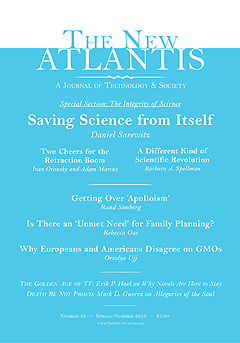CSPO News
Can Science Be Saved?
In a landmark new essay, Daniel Sarewitz explodes our myths about science and how it's supposed to work.
 Is the scientific enterprise in trouble? For all our investment of money and effort, for all of the millions of scientific articles published and thousands of PhDs graduated, for all the clinical trials conducted and big data analyzed, we appear to be stalling in our progress confronting challenges ranging from cancer to environmental degradation to education to poor nutrition.
Is the scientific enterprise in trouble? For all our investment of money and effort, for all of the millions of scientific articles published and thousands of PhDs graduated, for all the clinical trials conducted and big data analyzed, we appear to be stalling in our progress confronting challenges ranging from cancer to environmental degradation to education to poor nutrition.
Why should this be the case? Ask a researcher, and the answer is likely to be: “Not enough funding.” From a policymaker, the response might be that the United States isn’t producing enough STEM graduates, that the other side of the political aisle is “anti-science,” or that special interests have taken over the scientific agenda. Journalists and scientists have located the sources of science’s woes in problems with reproducibility, with fraud and incompetence, with conflicts of interest, with the peer-review process. What’s really going on?
In “Saving Science,” a landmark essay for The New Atlantis, CSPO co-director and SFIS professor Daniel Sarewitz identifies foundational problems in the scientific edifice. Prioritizing the “curiosity-driven” basic research that has long characterized our thinking about, funding for, and institutions of science is fundamentally misguided. The idea that the technological breakthroughs—airplanes, smart phones, computers, effective pharmaceuticals, the internet, GPS, etc.—that shape the modern world are the result of “the free play of free intellects” is mostly a myth. By buying into that myth, we’ve created a crisis in science, of which issues like irreproducibility and irrelevance are symptomatic.
Our task now is to steer the scientific enterprise back to solving real-world problems. Greater engagement with tangible issues—safe drinking water, disease treatments, better nutrition, and more equitable economic prosperity, for example—is the only way to help science fulfill its tremendous potential for social benefit.
The New Atlantis calls this “one of the most important essays we’ve ever published.” Read “Saving Science” in its entirety here.
You can read an interview with Dan Sarewitz for ASU Now here, and listen to him discuss his essay with New Atlantis editor Adam Keiper here.